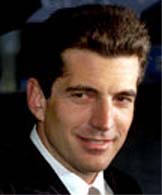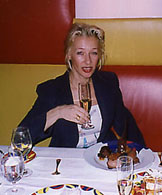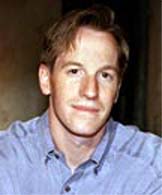 |
 |
 |
Blow
Low
By Tatiana
Pahlen
When the name Richard Blow first appeared in the news with the announcement that his book "American Son" was hitting bookstores, I was not surprised. As a matter of fact, I had expected it.
In early March of 1999, I went to Le Cirque for a birthday lunch in my girlfriend's honor. There was a large, rather quiet group seated at a neighboring table, which I had given only a passing glance upon entering the room. It was not until Senator Al D'Amato came over from their table and warmly greeted me that I noticed John F. Kennedy, Jr. among them. The Senator and I were previously unacquainted, and I am still pondering whether he thought he knew me or if this was just a part of his senatorial routine. But why hadn't he said hello to the Birthday girl, then? I watched him taking his seat next to John Jr., who, like the rest of the members of his pack, had already turned his head in my direction with rising interest. Soon after, the unlikely group began abandoning their chairs, and two of the fellows' business cards slipped into my hand as they left the restaurant. The first gentleman, approaching me assertively, asked me to join him for his next lunch. The second was more shy and looked around before pleading awkwardly with me to call him at any time. I tossed their cards into my purse, and only later, while watching the evening news, I did recognize some faces from that table; all were now engaged in a powerful speech given by Senator Al D'Amato honoring "George" magazine.
Seeing this, I looked through my purse in search of the two new cards. Sure enough, one read, Matthew Saal, Associate Editor, and the other, Richard Blow, Executive Editor of "George." Intrigued, I decided to give them a try. My ulterior motive was to publish my political cartoons, some of which had recently appeared in London, in the Eastern section of the "European Herald." All were based on former President Clinton's love affairs.
Which name to ring first? And who was who? I could not remember much of their faces. Both of them had looked rather plain. And there was little to identify them on their respective cards, which were like twin sisters marked by only the subtlest distinguishing characteristics. The giant word "George" was printed in gray on one, and in blue on the other, as if to signify rank. I chose the gray one, presuming that the bashful fellow was the one bearing the less illustrious title of Associate Editor.
Next morning, I dialed my new acquaintance. To my regret, an energetic, confident voice responded on the other end. I hung up before announcing myself; in general, I favor modest guys. For some reason I find them more appealing. Turning to the blue card, I read the name Richard Blow. I was kind of baffled. This chap didn't strike me as an executive type at all. Yet, analyzing the subject further, I considered that John F. Kennedy Jr. would probably prefer to work closely on a daily basis with someone faceless, mild-mannered and adaptive, such as Richard Blow. A lot of individuals dealing with fame and power would find it comforting to share their space with similar types. One might feel secure in the idea that one's entourage poses no threats. With these thoughts I reached for the receiver and dialed. A soft voicemail assured me that my call would be returned promptly, and I left a message with my name on the tape. A few minutes later, my phone rang and I recognized the meek voice on the line.
"Hi, it's Rich!" He paused, prompting me to take charge of the conversation.
"How was your lunch yesterday? I saw the rest of it on TV," I said, trying to sound more profound with the objective of plugging my cartoons into the discussion.
"Are you a model?" His bold, straightforward question disarmed me.
"Why?" I said bleakly. I wasn't sure that admitting my part-time job as a fur coat and lingerie model would help me to publish any of my materials.
"I couldn't take my eyes off you from the time you entered the dining room yesterday. I was so distracted, I didn't touch my lunch," he continued.
We agreed to meet at The Carlyle Hotel, at the infamous Bemelmans's Bar. To my embarrassment, I was quite a bit late. I spotted an old pal on the way in, a resident of the Hotel, who rose from his seat to welcome me. Having greeted him, I quickly moved on. I looked around for a moment before finding my new friend, Richard Blow, in the corner, hidden in a booth. He was finishing a Sea Breeze as I expressed regrets for being late. I noticed behind that humble voice and good-natured mask signs of a sturdy personality looming through the quiet impatience registered on his face. It took a gentle peck on his cheek and a cheering smile to calm him down. We ordered two more Sea Breezes. I tried recalling any unique features of his personality from my earlier encounter, but couldn't grasp onto anything, arriving only at the following characteristics: cautious, terrific listener, plain, almost banal, a pleasure to be around, a basic sense of humor, agreeable, overly polite. Not shocking, not awfully handsome, he had a fascination with the modeling world. I assumed he hadn't been a very popular boy in his teens. His revenge against exquisite vixens, who might have rejected him in the past, had been a forceful element of his successful social climbing. His concealed universe drew glitter like a magnet. And who other than a horde of models would be first to acknowledge a potentially successful man. Diverting the conversation from this dull subject, I told him about a book I was reading, "Name Dropping" by Barnaby Conrad. In return, asked what had he read last? Suddenly his eyes lit up.
"All Too Human," by George Stephanopoulos.
"It just came out," I blurted, "Did you already finish it?"
"Overnight! George is brilliant!" He continued with emotion. "It's the best written book in my view!"
"Isn't it kind of sneaky to keep an eye on the president, getting paid to keep his company daily, then shuffling information together to publish a book?"
"He is such a brainy writer!"
"Brainy enough to capitalize on scandals!"
"Brilliant!"
We ordered another round of drinks, but this didn't stop the executive editor of "George" from conversing passionately for hours about the same notorious book. I wondered to myself why his excitement was stretching to such an extreme? What was he up to? Had George Stephanopoulos introduced a turning point into the effortless life of Richard Blow? Did George know he had planted a bad seed in Richard's head in publishing his manuscript based on his employer, Bill Clinton?
Now, upon learning that "American Son" had reached number eight on The New York Times Book Review list, I went to Barnes & Noble to check it out. I wondered if Rich had dedicated his magnum opus to George Stephanopoulos?
I rebelled against purchasing the book, and sat instead in the coffee shop, where I began to study the simple pages, starting with the warm cover portraying John F. Kennedy, Jr. How clever, I thought. Sales would have been lower if the author had blown up his own image on the cover.
I found what I was looking for on page six.
There was the delicious part! In 1994, George Stephanopoulos had cornered a freshly budding editor, Richard Blow, at the gym in Washington DC. George had attacked him verbally for being such an ass, trashing Clinton's advocate and best speaker in the Republican publication "Regardie's," edited by himself, Richard Blow.
How clever, I marked again. Better to present Blow's idol as a foe than to be fingered as his copycat. And yet, probing into some pages from Stephanopoulos' "All Too Human," I found similarities in their depiction of their relationships with their bosses. Both described them as intense and intimate, but not as close friendships in terms of benevolence or affection towards one other. This would explain the ambiguity surrounding why Blow hadn't been invited to the wedding of his most amiable colleague.
What should have been the most vital part of the book looked more like the vacant work of a college student. The author had failed to expose his personal perspectives and ideas. No guts were revealed. One could neither pick a fight, nor fall from a stool. Everything came out cowardly: there was no stumbling at the corners, and no nosebleed while sampling his stuff. All went smooth and clean. Blow evidently didn't take chances. Playing it safe, he blew up a recollection of banal events, "parasiting on the subject matter" at the expense of a beloved "American Son.' "(These words "parasiting on the subject matter" I borrow from the photographer Peter Beard, a dear friend of Jackie O and her sister Lee. His various pictures of Kennedy's clan were published in every esteemed magazine.)
Portraying John F. Kennedy, Jr., in his book of 294 pages, Blow doesn't contribute anything more or less essential to the history. I was not able to discover more statements other than those I had already heard from his terse interviews with assertive Divas, like Barbara Walters and Katie Couric. The rumors he supplied, such as the tittle-tattle that Friday the dog was often sneaked into the "George" offices past the security guards, or that Carolyn bleached her hair and treated herself with Botox shots were inconsequential. So, what was the purpose of penning a book?
At least George Stephanoupolos had taken a shot at Clintons' issues with the absolute power of the eloquence that distinguishes him. Equipped with speedy and dynamic language, his spiny manuscript "All too human" possesses the absurdity and suspense that call to mind enticing detective stories. His book genially flourishes with refined analyses and a bold wit. None of these merits are to be found in "American Son."
I wonder if Richard Blow will ever produce another such opus since his source of inspiration has reached a dead end. If he does, I only hope it will not be called "American Daughter!"
|
May
15, 2002 |
Copyright © 2000 Tatianyc. All Rights Reserved.